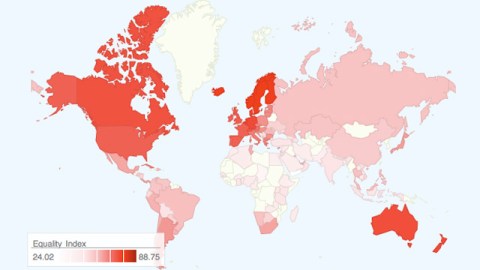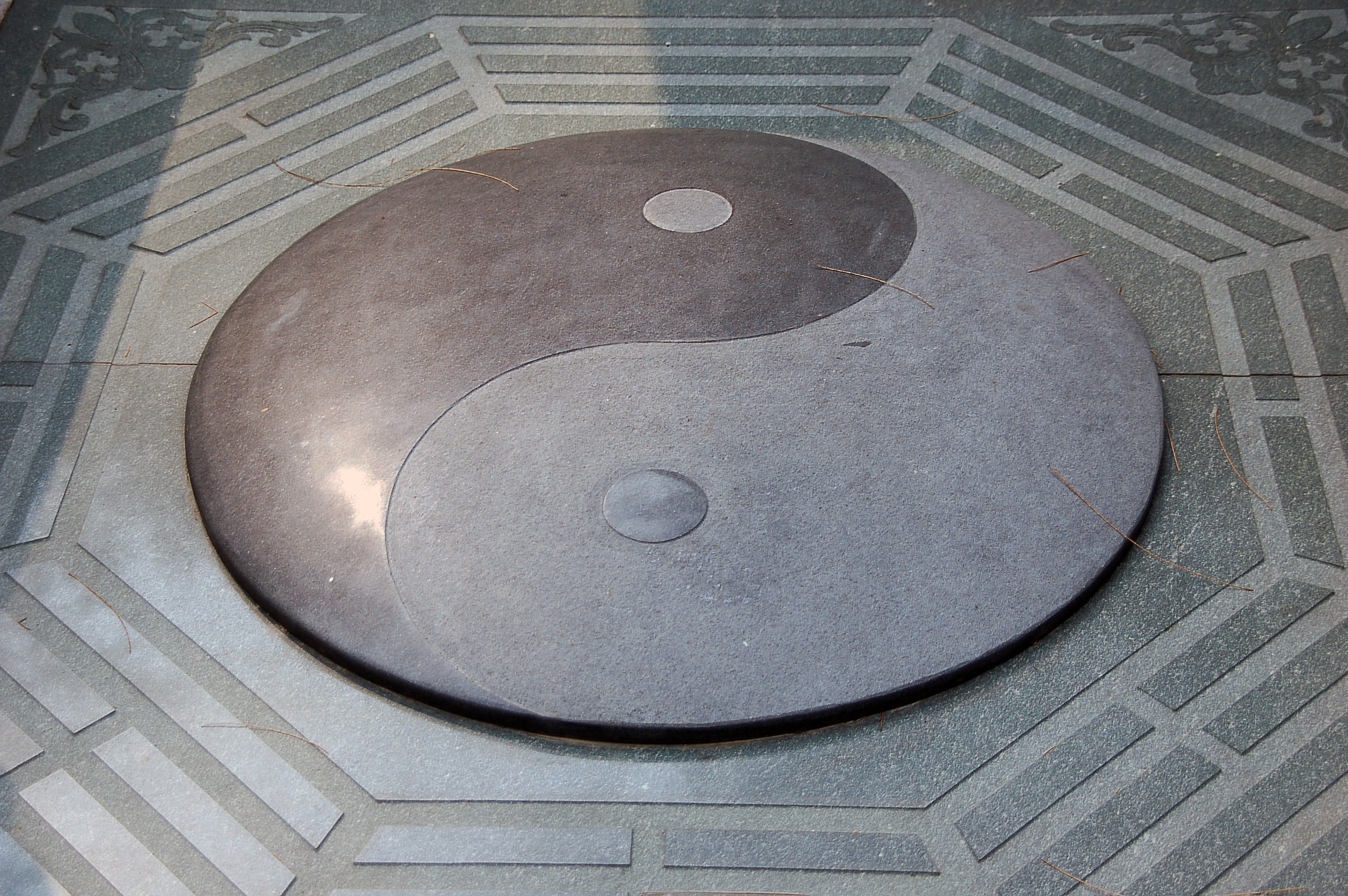Big Think’s Global Index of Women’s Power

While in many parts of the world today women enjoy greater power and opportunity than ever before, there are also places where women remain essentially powerless, lacking access to even basic education or human rights.
In consultation with leading universities and research groups, Big Think has created a composite country-by-country index by equally combining data from three recent international studies dealing with women’s power:
•The World Economic Forum’s “The Global Gender Gap Report,” an index which measures national gender gaps using economic, political, education and health criteria.
•The Economist Intelligence Unit’s “Women’s Economic Opportunity Index,” which measures women’s economic opportunity and their ability to participate equally in the workforce.
•The United Nations Development Programme’s Gender-Related Development Index (GDI) and Gender Empowerment Measure (GEM), which rank countries based on gender-specific criteria like adult literacy, life expectancy and estimated income.
The numerical Power Quotient, which averages the results of these studies, is on a scale from zero to 100—with 100 being the best possible numerical score for female empowerment, and zero the worst. Yemen, the country where women have the least power according to the survey, received a score of 24.02 on our scale. Meanwhile Norway, which got a score of 88.75, was found to be the country where women have the most relative power.
The table below indicates where each country falls along our scale; move your cursor over each to find its Power Quotient. The off-white countries were not included in the survey because there was not enough information available about them.
Power Quotient by Country
A key source of the research this index draws upon is the World Economic Forum’s Global Gender Gap 2010 Report, which was released in mid-October. Saadia Zahidi, a director at the World Economic Forum and co-author of the Gender Gap report spoke with Big Think shortly after its release. She highlighted themes present in World Economic Forum report that also are present in Big Think’s composite index.
“When we look at gaps, what we’re finding is that in the world as a whole, at least out of the 134 countries that we’re looking at, 96% of health gaps have been closed. Ninety-three percent of education gaps have been closed,” says Zahidi. Yet, she adds, “only about 59% of economic participation gap and only 18% of the political empowerment gap.” Looking at these trends, Zahidi says that women are starting to be as healthy and almost as educated as men, yet this has not been translated into decision-making in either the economy or in government.
As for the economic outlook, Zahidi says, “While for a certain segment of society, the idea of a man session may be true, it’s not true for other parts of society.” The economic downturn is having effect on the global gender gap, says Zahidi, with fewer resources available for transformative programs such as women’s education and empowerment.
Empowering women and collapsing the gender gap goes beyond remedying a wrong, says Zahidi. As well, it can be a boon to economies.
“It really does come down to girls’ education and investing in that because it has enormous multiplier effects,” she says.
— Appendix A – Big Think’s Women and Power Index (Raw Data)
| Norway | 88.75 | Croatia | 68 | Jordan | 56.62 |
| Sweden | 88.37 | South Africa | 67.66 | Lebanon | 56.54 |
| Finland | 88.08 | Mexico | 67.26 | Armenia | 56.14 |
| Iceland | 87.14 | Korea | 66.97 | Bolivia | 54.61 |
| Belgium | 85.32 | Panama | 66.87 | Sri Lanka | 54.42 |
| Netherlands | 84.43 | Albania | 66.12 | Nepal | 54.15 |
| Denmark | 84.1 | Uruguay | 65.42 | Oman | 54.14 |
| Germany | 84.05 | Chile | 65.38 | India | 53.09 |
| New Zealand | 84 | Tunisia | 65.2 | Tanzania | 52.91 |
| Australia | 83.29 | Peru | 65.04 | Turkey | 52.34 |
| Canada | 82.53 | United Arab Emirates | 64.44 | Indonesia | 52.21 |
| Switzerland | 81.14 | Romania | 63.96 | Ghana | 52.2 |
| United Kingdom | 80.5 | Mauritius | 63.47 | Kenya | 51.55 |
| Spain | 80.1 | Brazil | 62.93 | Uganda | 51.48 |
| France | 79.79 | Bahrain | 62.43 | Azerbaijan | 51.37 |
| United States | 79.7 | Malaysia | 62.38 | Georgia | 50 |
| Ireland | 79.43 | Philippines | 62.37 | Cambodia | 49.16 |
| Portugal | 78.39 | Namibia | 62.31 | Syria | 48.07 |
| Luxembourg | 78.28 | Thailand | 62.18 | Benin | 48.03 |
| Austria | 77.2 | Russia | 62.17 | Senegal | 47.03 |
| Italy | 74.76 | Lesotho | 61.94 | Nigeria | 46.46 |
| Israel | 74.54 | Kazakhstan | 61.9 | Madagascar | 46.02 |
| Cuba | 74.2 | Kuwait | 61.74 | Morocco | 45.73 |
| Slovenia | 73.74 | Colombia | 61.62 | Zambia | 45.65 |
| Greece | 73.61 | Venezuela | 61.56 | Algeria | 45.59 |
| Czech Republic | 73.46 | Dominican Republic | 61.28 | Laos | 45.14 |
| Jamacia | 73.16 | Moldova | 60.82 | Cameroon | 44.88 |
| Estonia | 72.95 | China | 60.74 | Iran | 44.26 |
| Latvia | 72.65 | Honduras | 60.57 | Saudi Arabia | 43.92 |
| Lithuania | 72.03 | El Salvador | 59.81 | Burkina Faso | 42.25 |
| Poland | 71.21 | Qatar | 59.76 | Ethiopia | 42.13 |
| Bulgaria | 71.18 | Ukraine | 59.27 | Egypt | 41.9 |
| Singapore | 71.12 | Paraguay | 58.92 | Pakistan | 41.47 |
| Macedonia | 71.07 | Botswana | 58.87 | Côte d’Ivoire | 40.79 |
| Hungary | 70.81 | Nicaragua | 58.06 | Bangladesh | 39.16 |
| Slovaki | 70.7 | Ecuador | 58 | Chad | 35.39 |
| Cyprus | 70.39 | Maldives | 57.86 | Yemen | 24.02 |
| Argentina | 70.09 | Vietnam | 57.53 | ||
| Japan | 68.71 | Kyrgyz Republic | 57.46 | ||
| Costa Rica | 68.29 | Serbia | 57.01 |




